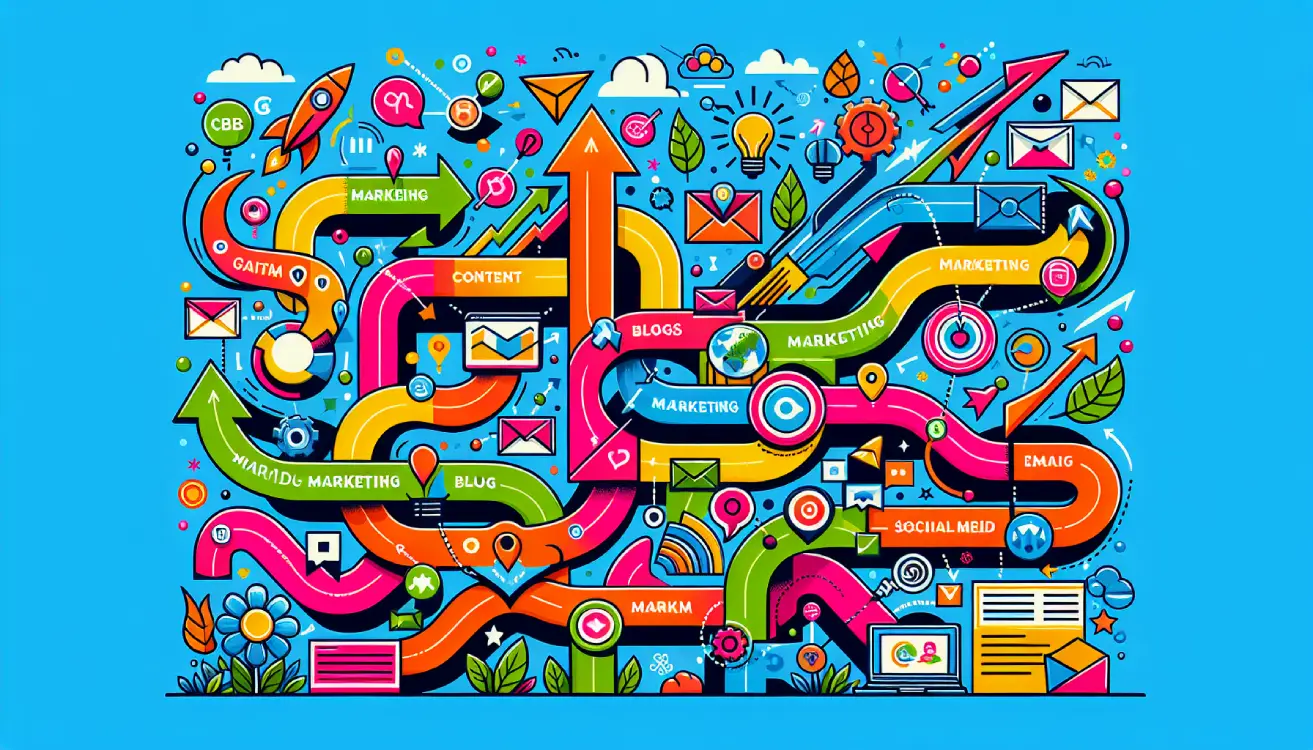Startups in the B2B space face unique marketing hurdles. They must educate and convince other businesses, not individual consumers. By 2025, competition is fierce: nearly half of B2B companies plan to boost their content budgets, and 69% plan to invest more in video marketing. To thrive, early-stage companies need a clear plan. This guide covers how B2B startup marketing differs from B2C, and it breaks down proven strategies that work in 2025 to help you define your audience, set SMART goals, sharpen your messaging, and use the right channels to grow.
Understanding B2B Marketing for Startups
B2B marketing for startups means selling products or services to other companies. It often involves longer sales cycles and multiple decision-makers. For example, Via Marketing notes that a typical B2B sales cycle can be around three months, with each buyer conducting an average of 12 online searches before engaging. Unlike B2C’s quick transactions, startups must nurture a buying committee (e.g., technical, finance, and operations teams) through awareness, evaluation, and decision stages.
The goal is to build brand awareness and highlight a clear value proposition to the businesses that will benefit most from your solution. That means understanding industry-specific pain points and speaking directly to them. B2B audiences research deeply and expect detailed information (case studies, ROI analyses, specs). By positioning yourself as a solution to their specific problems, you can win trust. In practice, this requires consistent, targeted outreach across channels and departments, not just blasting ads. Effective startups listen to buyer feedback and tailor messaging to each stakeholder’s needs.

Key Differences: B2B vs. B2C
- Audience: B2B targets companies and professional buyers; B2C targets individual consumers.
- Decision Process: In B2B, purchasing often involves a team (technical, legal, and budget approval) and a complex approval cycle. Sales are higher-stakes and longer-term (average ~102 days).
- Buying Criteria: B2B buyers are highly analytical and want data-driven proof (spec sheets, demos, pilot programs) before buying. B2C buying can be more impulsive.
- Content & Messaging: B2B content is often educational and detailed. Instead of emotional appeals, B2B marketing focuses on ROI, efficiency, and reliability.
Startups must tailor every strategy to these realities. That begins with deeply understanding who your ideal buyers are.
Personal Relationships Are More Important In B2B Markets
The key characteristic of the business-to-business market is personal relationships. A few customers who often buy directly through the business supplier have fairly easy access. Sales and technicians visit customers. People use names. Relationships develop. Typically, business suppliers are able to offer loyal customers for several years with a long-lasting commitment.
Defining Your Ideal Customer Profile (ICP)
A B2B Ideal Customer Profile (ICP) is a detailed description of the company that would benefit most from your product/service. Defining an ICP is crucial for focusing your marketing and sales efforts on the most promising targets. When creating an ICP, consider:
- Company Attributes: Industry, company size (revenue, headcount), business model, geography.
- Pain Points: The specific problems or needs your solution addresses. For example, cost savings in manufacturing or compliance challenges in healthcare.
- Buying Behavior: Typical purchase cycle length, budget availability, and who the decision-makers are (CIO, procurement manager, etc.).
By targeting only the segments that match this profile, a startup avoids wasting time on low-fit leads. (Via Marketing’s team often helps startups by refining ICPs when building marketing plans.) For example, a SaaS security startup might define its ICP as a mid-size tech company in North America with a recent history of data breaches. Having a clear ICP helps you tailor your messaging, you know exactly what pain points and priorities to highlight.
Setting SMART Marketing Goals
Successful B2B startup marketing starts with clear goals. Use the SMART framework to make them actionable: Specific, Measurable, Achievable, Relevant, Time-bound. For instance:
- Specific: “Acquire 50 MQLs (marketing-qualified leads) from our tech sector ICP via the website by the end of Q2.”
- Measurable: Ensure you can track metrics (leads, visits, demo signups) to know if you’re on target.
- Achievable: Base goals on reality, e.g., if you have a small team, don’t promise 10x growth in one month.
- Relevant: Align goals with business priorities (e.g., if revenue is the goal, focus on lead quality and conversion).
- Time-bound: Deadlines create urgency (“Increase LinkedIn followers by 30% in 6 months”).
Examples of SMART goals might include:
- “Generate 200 qualified leads per month from organic SEO, content marketing, and PPC by December 2025.”
- “Increase demo requests by 25% in six months through targeted email campaigns to industry segments.”
- “Improve customer retention by 15% year-over-year via a new client success program and regular follow-ups.”
Once goals are set, regularly track them with tools like Google Analytics (for website/traffic metrics) and a CRM (for lead/sales metrics). Shared goals and metrics also help align marketing with sales. For instance, hold weekly syncs with sales so marketing knows which types of leads close fastest. It’s also useful to define shared metrics: e.g., not just # of leads, but lead-to-customer conversion rates. A feedback loop (sales reporting lead quality) lets marketing adjust campaigns quickly.
Crafting a Compelling Value Proposition
Your value proposition is a clear statement of why a customer should choose your solution. It highlights the unique benefits you deliver and how you solve key problems better than alternatives. For startups, a strong value prop builds credibility with risk-averse B2B buyers. Follow these tips:
- Focus on Benefits, Not Just Features: Instead of saying “Our software has real-time analytics,” say “Our real-time analytics dashboard helps you cut decision-making time by 50%.” Quantify the impact, if possible.
- Address ICP Pain Points: If your ICP is finance teams, emphasize cost savings or compliance. If it’s IT, emphasize security and ease of integration. Show empathy (“We understand slow reporting is costly our tool fixes that.”).
- Differentiate Clearly: What makes you unique? Maybe your service includes free onboarding, or you specialize in a niche industry. State it plainly.
- Back It Up: Use data, case studies, or testimonials. For example, “Acme Corp cut operational costs by 20% using our solution” is stronger than an unsubstantiated claim. Case studies of similar-sized startups or growth-stage firms are especially persuasive.
- Keep It Simple: A one-sentence core message is ideal, supported by a brief elaboration. Revisit and refine your messaging as you learn more about what resonates.
Every piece of content (webpage, pitch deck, ad) should reinforce this value prop. (ViaMarketing’s Brand Positioning services help startups hone messaging and positioning in the market.) Remember, B2B buyers value clarity above cleverness.
Developing a Data-Driven Marketing Plan
A well-documented marketing plan ties everything together: target audience (ICP), goals, strategies, channels, budget, and metrics. Steps to build this plan include:
- Market Research: Analyze competitors, market size, and customer needs. Tools like industry reports or simple surveys help. For example, identify which features competitors offer.
- Define Strategies per Goal: For each SMART goal (e.g., “Increase demo sign-ups”), outline the tactics and channels to use. This might involve SEO content, email sequences, or targeted LinkedIn outreach.
- Budget and Resources: Allocate budget and assign team responsibilities for each channel. Startups often have tight budgets, so focus on high-ROI activities (see stat below on content spend).
- Tactics Schedule: Create a calendar of campaigns and content. For example, schedule blog posts, email send-outs, and webinars aligned with product launch dates or industry events.
- Metrics & KPIs: List which metrics you’ll track (e.g., website traffic, MQLs, conversion rates). Set up dashboards in Google Analytics and your CRM so you can review performance weekly.
By formalizing the plan, your startup can execute marketing initiatives systematically instead of haphazardly. A plan also helps cross-functional teams (sales, product) stay coordinated. If you need guidance, consider Via Marketing’s Marketing Strategy & GTM Planning Services, which specialize in building B2B go-to-market strategies for startups.
Agile Marketing for Startups

Startups must be nimble. Agile marketing means running campaigns in short “sprints,” constantly testing and iterating. Rather than a year-long plan you can’t change, do cycles of 2-4 weeks: launch a small campaign, measure results, learn, and tweak. Key agile practices include:
- Experiment and Test Quickly: Use A/B testing on email subject lines, landing pages, or ad creatives to see what resonates. For example, test two different headlines for a whitepaper landing page and double down on the winner.
- Rapid Iteration: If a blog topic or channel isn’t gaining traction, pivot fast. Startups don’t have the luxury of waiting. Adjust your content or channel mix based on real-time data.
- Cross-Functional Teams: In an agile squad, marketers, developers, and sales collaborate on campaigns. For instance, a content writer and an SEO specialist work together to optimize a blog post for search.
- Frequent Reviews: Hold weekly or bi-weekly review meetings to check progress against goals. Use dashboards and analytics to decide if a strategy is working or needs an overhaul.
Because resources are limited, focus on quick wins (like optimizing existing high-traffic pages for conversions) and measure success rigorously. Even small improvements add up. For example, by automating an email nurture series (see “Marketing Stack” below), some startups see lead engagement jump by 30%. The key is to fail fast and learn fast.
Common B2B Startup Marketing Challenges
Startups share some common hurdles. Being aware of these can help you plan around them:
- Limited Budget and Team: You may not be able to afford large ad spends or big marketing teams. Prioritize low-cost, high-impact tactics (e.g., SEO, organic social, partnership outreach) and consider outsourcing or freelancers for specialized tasks.
- Building Brand Trust: As a new name, you need to convince prospects you’re reliable. Leverage social proof (testimonials, case studies) and thought leadership (blogs, webinars) to show expertise.
- Standing Out in a Crowded Market: Established players often dominate attention. Focus your message on a niche ICP or unique feature where bigger competitors don’t specialize.
- Aligning Marketing & Sales: Startups can suffer from misalignment. Make sure sales feedback flows to marketing (e.g., which leads convert) so you’re not wasting effort on uninterested accounts.
- Rapid Market Changes: Industries evolve fast. Stay agile: monitor competitor moves and emerging trends (for example, AI tools or regulatory changes) and adjust your messaging or product positioning accordingly.
Being prepared for these challenges and using data to guide decisions will keep your marketing on track even when obstacles arise.
Leveraging Digital Marketing Channels

For B2B startups, digital channels are indispensable for generating awareness and leads. Key channels include:
- Search Engine Optimization (SEO): A strong SEO strategy drives organic traffic over time. In fact, ~57% of B2B firms say SEO generates more leads than any other channel, and organic search often contributes the largest share of revenue in B2B. Focus on publishing high-quality content (blogs, whitepapers, product pages) that answers your ICP’s questions. Optimize on-page SEO (title tags, headings, site speed) and build backlinks by guest posting or partnerships. Startups should target long-tail keywords specific to their niche (e.g., “cloud backups for fintech startups”) to rank faster.
- Email Marketing: Email remains extremely cost-effective. Studies show that B2B email yields huge ROI. On average, companies get $30-$44 back for every $1 spent. To leverage this, build a mailing list via gated content (eBooks, webinars) and send regular nurturing emails. Segment your list by ICP or buyer stage, and personalize content (industry insights, tailored offers). For example, sending a case study about a similar client’s success can nudge a mid-stage prospect. Automation tools like Mailchimp or HubSpot can send trigger-based sequences (welcome series, follow-ups) that increase open and conversion rates.
- Social Media Marketing: Platforms like LinkedIn, Twitter, and even Facebook have a role in B2B. In fact, 75% of B2B buyers check social media during their decision process. LinkedIn is crucial for professional networking, maintaining an active company page, sharing industry insights, and using LinkedIn Ads to target job titles or companies in your ICP. Twitter can position your brand as a thought leader; participate in relevant conversations or hashtags. While social alone may not close deals, it builds credibility. Automating posts with tools (Buffer, Hootsuite) ensures consistent presence, and tracking platform analytics shows what content resonates.
- Pay-Per-Click (PPC) Advertising: Paid search and social ads can jump-start lead generation. Google Ads allows targeting keywords where intent is high (e.g., “enterprise inventory software”). B2B Google Ads differ from B2C: the audiences are niche and costs per click are higher, but each click is more valuable. Use highly targeted ad groups (e.g., by industry or function) and ad extensions to provide more info. LinkedIn Ads (Sponsored Content, InMail) let you directly target decision-maker roles in chosen companies. Since budgets are limited, start with a small test budget, measure cost per lead, and scale what works. (ViaMarketing’s Google Ads Management specializes in optimizing B2B PPC campaigns.)
Each channel should be tied back to your goals. For example, if brand awareness is lagging, allocate more to LinkedIn and content; if lead gen is the aim, SEO and targeted PPC might pay off faster.
Content Strategy for B2B Startups
Content is the engine that powers most digital channels in B2B. A strong content strategy educates your ICP and guides them through the buyer journey. Key elements:
- Educational Blog Posts and SEO Content: Create blog articles addressing your audience’s pain points. According to the Content Marketing Institute, nearly half of B2B marketers plan to increase content spending. Useful content (how-tos, industry trends, best practices) attracts organic traffic and builds authority. For example, a cloud security startup might write “Top 5 Compliance Challenges for Fintech Companies” to attract finance sector readers. Stats show B2B audiences consume on average about 4-5 pieces of content before engaging a vendor. Aim to have multiple touchpoints: blog, checklist, webinar, etc., so prospects stay engaged.
- Long-Form Content & Thought Leadership: Whitepapers, eBooks, and webinars demonstrate expertise. These can be gated to capture leads. Offer a technical eBook or a webinar with industry experts to mid-funnel prospects. Content that includes original research or data (e.g., survey results) tends to attract attention. Studies indicate sites publishing original research see ~30% higher traffic.
- Case Studies and Social Proof: Develop case studies showing how real clients achieved results with your product. These help convert prospects in the decision stage. Even small startup clients can focus on results (reduced costs, faster processes, etc.). Include logos/testimonials on your site.
- Video Content: With 69% of B2B marketers boosting video spend in 2024, consider explainer videos or demo clips. LinkedIn posts with short videos tend to get high engagement. Videos can also be embedded in email nurturing.

Always tie each piece of content to SEO strategy: use keyword research to identify what your ICP searches for, and optimize content accordingly. Over time, a systematic approach to content (e.g., a published blog weekly) builds traffic and leads. Given resource limits, startups can repurpose content: turn a webinar into blog posts, infographics, and short LinkedIn posts to maximize output.
Mapping the B2B Buyer’s Journey
Understanding the buyer’s journey helps you deliver the right content at the right time. The journey typically has stages:
- Awareness Stage: Prospects realize they have a problem. Content here should educate. Examples: blog posts, industry guides, educational videos, and social media shares. The goal is to get on their radar.
- Consideration Stage: Prospects evaluate solutions. Provide detailed resources like whitepapers, webinars, comparison charts, or ROI calculators. For example, offer a webinar demo of your platform to those who downloaded an introductory eBook.
- Decision Stage: Prospects are ready to buy. Present case studies, demos, free trials, and personalized proposals. Ensure product pages clearly state benefits and pricing.
Map your ICP’s journey by asking: “What information would make a procurement manager confident to schedule a call?” Then ensure you have content for each step. Using a CRM, tag leads by funnel stage to send appropriate follow-ups. For instance, someone who downloads a whitepaper might get an email next offering a case study.
Account-Based Marketing (ABM) for High-Value Targets
Account-Based Marketing (ABM) is a highly targeted approach that is ideal for B2B startups that are looking for specific high-value clients. Instead of broad campaigns, ABM treats each target company (account) as its own market. It combines marketing and sales to create personalized experiences for those key accounts. Consider ABM if your ICP includes a few large prospects or niche companies. Key ABM practices:
- Identify Target Accounts: Use your ICP criteria to select a shortlist of high-potential companies (e.g., top 10 logos you want). Leverage firmographic data and intent signals.
- Research & Personalize: Learn each target’s pain points and decision-makers. Tailor content, even emails or direct mail, to their industry and needs. For example, create a landing page addressing Company X’s specific challenges.
- Coordinate Outreach: Align marketing (ads, social, content) and sales outreach (calls, LinkedIn InMail) on the same messaging. Repeat exposure through multiple touchpoints.
- Measure Account Engagement: Track metrics at the account level (e.g., website visits from that company, content downloads) and have sales follow up on high-intent signals.
ABM can significantly boost conversion on big deals. In fact, industry surveys show ~67% of B2B companies use ABM, and 81% report higher ROI from ABM than other tactics. Startups can start with a “one-to-few” ABM approach, targeting a handful of companies. For example, a SaaS startup might target 20 companies in the healthcare sector, personalizing email campaigns for each. Even small personalization (customized email subject or reference to a company’s news) increases response rates.
Building Your Marketing Technology (MarTech) Stack
Today’s B2B marketing relies on technology to automate, track, and optimize. Your MarTech stack could include:
- CRM Platform: (e.g., Salesforce, HubSpot CRM) is central to track all interactions. It stores your contacts, accounts, and deals, and shows where each prospect is in the pipeline.
- Marketing Automation: (e.g., HubSpot, Marketo, Pardot) automates email campaigns and lead scoring. For instance, Marketo can send a series of nurturing emails when someone downloads a whitepaper, and track who opens and clicks, helping you focus on the hottest leads.
- Website/CMS: (e.g. WordPress, Webflow) where your content lives. Ensure it’s SEO-friendly and collects lead info (forms, chatbots).
- Analytics Tools: (Google Analytics, LinkedIn Analytics) measure web traffic and conversions. Monitor user behavior on your site and ad campaigns’ performance to refine your strategy.
- Social & Content Tools: (Buffer, Hootsuite, or LinkedIn’s Campaign Manager) for scheduling posts and ads.
- ABM/Intent Tools: (like 6sense, Terminus, or even LinkedIn Matched Audiences) help identify when target accounts are in-market. According to research, 91% of marketers use intent data to prioritize accounts. These tools can notify you when prospects from target companies visit your site or search for your keywords.
Investing in the right stack helps do more with less. For example, a startup using HubSpot finds that automated workflows free up hours per week and double their email response rates. Also, routinely review whether your tools integrate, e.g., connect your CRM with email and analytics, so data flows smoothly.
Conclusion: Key Takeaways and Next Steps
In summary, B2B marketing for startups is about strategic focus and adaptability. Key takeaways:
- Know Your Target: Define your ICP and create buyer personas for each decision-maker type. Use these to tailor every message.
- Set SMART Goals: Make goals clear and data-driven. Align marketing metrics with sales outcomes, and adjust monthly.
- Nail Your Messaging: Develop a strong value proposition centered on your customers’ needs. Use proof points like case studies.
- Build and Iterate: Develop a lean marketing plan covering channels like SEO, content, social, email, and PPC. Use an agile approach to test, measure, and pivot quickly.
- Leverage Technology: Use a CRM and marketing automation to scale personalized outreach. Track everything with analytics.
- Focus on Quality Accounts: For high-value deals, use ABM. Personalize outreach to a few key targets rather than a broad spray of generic ads.
Each of these strategies has roots in current industry best practices. For startups, the emphasis should be on learning fast and using data to guide which tactics to double down on. Remember that nearly half of B2B companies are boosting their content budgets and 69% are upping video spend, signaling the continued importance of content-driven growth.
🚀 Ready to accelerate your startup’s B2B growth? Get expert help turning these strategies into action. Via Marketing offers Fractional CMO and B2B marketing services from strategic SEO and content to paid campaigns tailored for startups. Contact Via Marketing to schedule a consultation and kick off your results-driven B2B marketing plan!